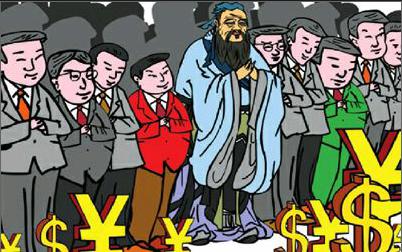Confucianism vs. Commercialism
2015-01-15

The past decade or so has seen an everrising enthusiasm in China for Confucius(551-479 B.C.), a great ancient philosopher, and his philosophy that is widely known as Confucianism. Every day, almost 3,000 people come to commemorate Confucius in his hometown Qufu in east Chinas Shandong Province, with grand memorial ceremonies held frequently.
Realizing this opportunity, the local government has begun to invest large amounts of money and time in the development of Confucianism. This year, it decided to promote Confucian studies in each of its 405 villages. It is hoped that the enhancement of Confucianism will help raise social morals.
Meanwhile, schools and training centers related to Confucius and Confucianism are being set up at a fast pace. These institutions usually charge high tuition fees to make big profits. In Qufu, there are more than 1,000 investment companies engaged in Confucius-related cultural industries.
This kind of craze is to some extent helping make Confucianism better understood by more ordinary people. However, some people doubt the result of promoting Confucianism in this way, afraid that the craze is mostly commercially motivated, and thus it will do little to boost Confucianism in the authentic sense. Also, the local governments decision to set up Confucian studies in villages under its jurisdiction triggered controversy, a deed seen by some as a waste of taxpayers money. People from different sectors of society expressed their views on this phenomenon.
Commercial interests
Mao Jianguo (China Youth Daily): Chinas traditional culture manifests as important in modern times in different ways. A lot of problems posed these days need treating through the application of traditional culture. We are thus glad to see that Confucianism is being embraced by more and more people in China. However, we must make it clear whether the flare-up of Confucianism is out of cultural significance or commercial objectives.
The current prosperous picture in Qufu is to a large extent due to commercial reasons. Investors keep flowing into the city; a certain tourism program will invest 10 billion yuan ($1.6 billion) in Qufu, which will make the highest statue of Confucius in the world and the largest Confucian-themed holiday resort. Meanwhile, the craze for researching Confucius and publishing Confucian-related books—or even some researchers lecture-giving tours around the country—are undoubtedly motivated by commercialism.endprint
Culture is not born to be an enemy of business. Culture can develop into profit-making industries while economic development can help promote cultural progress. Commercial participation helps ancient culture mingle better with modern society. Meanwhile, we have to admit that “cultural prosperity” is not equal to“economic prosperity” and vice versa.
Im not opposed to the rise of Confucianrelated economy. Im more interested in the rise of the Confucian culture itself. True enthusiasm with the Confucian culture will encourage people to absorb the essence of Confucianism and practice it in daily life. As a result, individualspersonal moral standards will keep rising, potentially improving the countrys sociocultural environment.
As the current drive to promote Confucianism cant be read as societys real enthusiasm for this culture, its important to prevent Confucianism from getting lost in the haze of economic development. There is still a long way to go before we see the prosperity of the Confucian culture in the real sense, and it will never be achieved by simple event programming. It is a time-consuming process.
I believe Chinese society needs to make good use of the Confucian culture to relieve itself of modern pains. However, the culture will make a positive impact only when its development is not subject to commercial interests.
Tang Yahua (www.rednet.cn): The current direction the Confucian culture craze in Qufu is heading for is somewhat worrisome. Scholars are busy, because theyll get high payments for giving classes on Confucianism; businessmen are busy, as they are buying land and building Confucianism schools, which can charge high tuition fees; and the local government is busy attracting more local people to Confucianism courses. Given all of these activities, it would seem hard for people not to connect the so-called Confucian craze to commercial motivations. Although Confucianism does not reject commercial involvement, as it also stresses engagement with social life, commercialized Confucianism isnt the point.
That said, its great to see the rise of Confucian studies and promotion in Qufu and many other places. In modern times, people may feel anxious due to rapid economic and social transition and development, so the Confucian culture can offer rich resources to cope with many modern issues. Properly tapping into this rich cultural mine will improve peoples well-being and the countrys overall development. However, if possible, Confucianrelated cultural activities should try not to mix too much up with commercial activities. What we dont want to see is certain businesses making huge profits in the name of Confucianism, while the culture itself becomes ignored and obsolete.endprint
Changing times
Wang Xiaodong (Global Times): Confucius is a great philosopher and educator in the Chinese history. The thinking and values that he championed compose invaluable treasure for the Chinese nation. However, the world today is quite different from the one Confucius lived in, and China has changed a lot since his time. If Confucius were still alive today, he would not agree to impose the whole set of his ideas on todays society. This is something the scholars, businessmen and the local government, all of whom are involved in this round of craze for Confucianism, must think about carefully before taking further actions.
With the support of the local government, businesses naturally will make full use of the opportunities provided by Qufu in terms of Confucius and the Confucian culture. This is evidenced by the facts that investors keep rushing into the hometown of Confucius and that new schools and cultural industrial parks are popping up.
As for the massive movements to build up Confucianism studies in the villages, we have to understand that the government intends to do something that will help improve local peoples knowledge of traditional culture and moral standards.
We dont oppose businesses taking advantage of traditional culture to make profits. When there is need for the culture in the market, its good that some businesses are selling related products. Then what about the image of Confucius and the image of traditional Chinese culture? When Confucianism is too much closely intertwined with business activities, we quite doubt the result of reviving the culture in this way. This is something the public and the descendents of Confucius need to think carefully about. There must be better ways to promote and spread Confucian ideals.endprint
